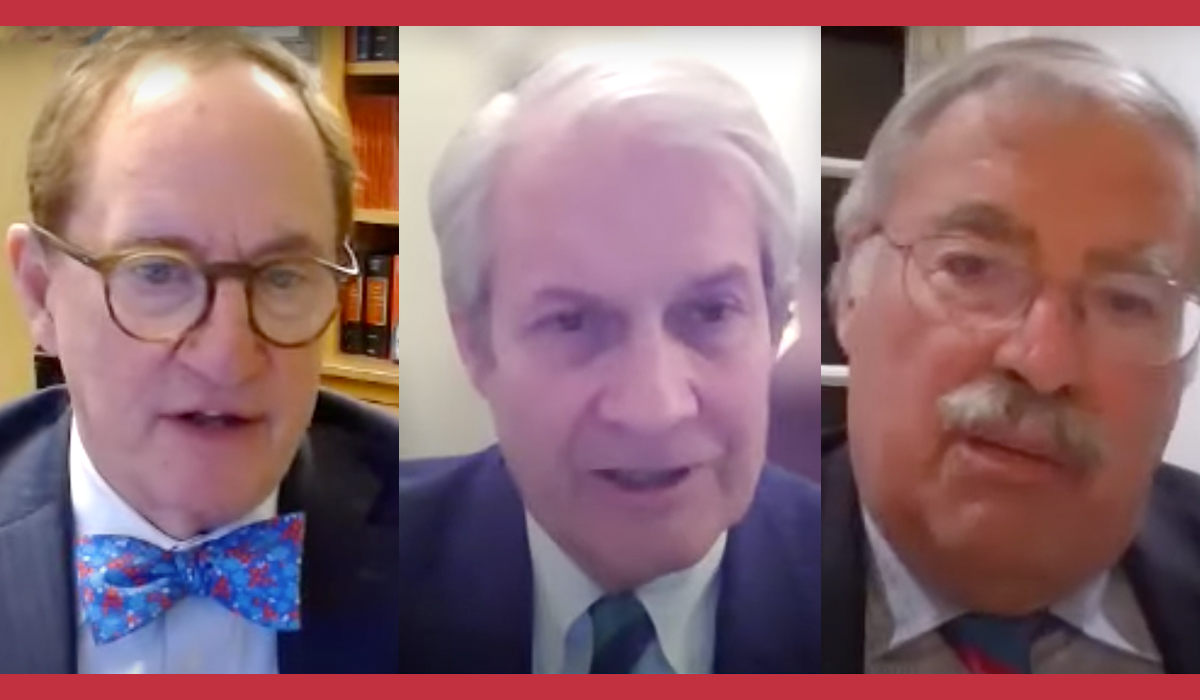 On Monday, February 13, 2023, Catholic Law—in collaboration with the American Enterprise Institute and co-sponsored with Catholic Law’s chapters of the Federalist Society and the Democratic Law Students Association—hosted second annual The Seigenthaler Debates, an annual series that is part of Catholic Law's First Amendment Initiatives.
On Monday, February 13, 2023, Catholic Law—in collaboration with the American Enterprise Institute and co-sponsored with Catholic Law’s chapters of the Federalist Society and the Democratic Law Students Association—hosted second annual The Seigenthaler Debates, an annual series that is part of Catholic Law's First Amendment Initiatives.
The virtual program provided attendees with an opportunity to hear from two First Amendment scholars on the topic - Resolved: “The legal regime for defamation inaugurated by New York Times v. Sullivan is too protective of free speech over reputation.” Rodney A. Smolla, President of Vermont Law and Graduate School, argued the pro position, and George Freeman, Executive Director of the Media Law Resource Center, the con position. Judge Thomas B. Griffith, special counsel to Hunton Andrews Kurth LLP, who has recently served as a federal judge on the United States Court of Appeals for the District of Columbia Circuit, acted as the program’s moderator.
After a welcome from Robert Doar, President, American Enterprise Institute, and Professor A.G. Harmon, Associate Dean of Bench and Bar Programs, Professor Marshall Breger introduced the debaters and moderator. Following the introductions, Breger celebrated the work and life of the late Judge Laurence Silberman of the United States Court of Appeals for the District of Columbia.
This debate was dedicated to Judge Silberman’s memory because of his strong interest in revisiting NY Times v. Sullivan in both judicial opinions and public discourse. The organizers of the debate had reached out to Silberman for advice regarding the drafting of the moot court problem accompanying this debate right before his untimely death.
Over the course of ninety minutes, Smolla and Freeman laid out their arguments regarding the free speech protections, who is really being protected, reputational interest claims, and then used their position to respond to questions posed by Judge Griffith. There was also an opportunity for the audience to submit questions through the moderator. As the program ended, both debaters were given time for final remarks. Following the debate, Harmon offered thanks to each of the debaters, the moderator, and the audience for their time.
Professor Marshall Breger’s remarks regarding Judge Silberman:
Judge Larry Silberman was an iconic judge, one of a small group of appellate court judges like Henry Friendly and Learned Hand who are spoken of in the same breath as their Supreme Court colleagues.
We have dedicated this debate to Judge Silberman’s memory because of his strong interest in revisiting NY Times v. Sullivan in both judicial opinions and public discourse. We had reached out to him for advice regarding the drafting of the moot court problem accompanying this debate right before his untimely death.
I first met Larry Silberman in 1981 when, as a young acolyte in the Reagan Revolution, I came to the Heritage Foundation as a Senior Fellow. I was soon invited to lunch at AEI by Irving Kristol, Walter Berns and Michael Novack, and we were often joined by Larry Silberman. With Larry, lunch was never chit chat, but serious probing conversation. I felt like I was reliving my viva voce at Oxford and that I had to prepare studiously for the lunch questioning. It was glorious.
When I was appointed Solicitor or Labor, I came to him—now Judge Silberman—for advice as that was one of his early jobs in his distinguished government career. He was more than generous. And I continued to take advantage of his wisdom throughout my time at the Department of Labor and in academic life.
Judge Silberman respected reasoned argument. He spoke directly and he respected you for doing so as well—whether or not you agreed with him. He gave as well as he got. But if you convinced him with argument he would “confess error.” He was more concerned with sense than with sensibility—not a popular view these days. In his later years he provided a clarion call against the excesses of “cancel” culture in both popular thought and in law schools. We may hope that his admonitions in that area may yet bear fruit.
May his memory be a blessing.
